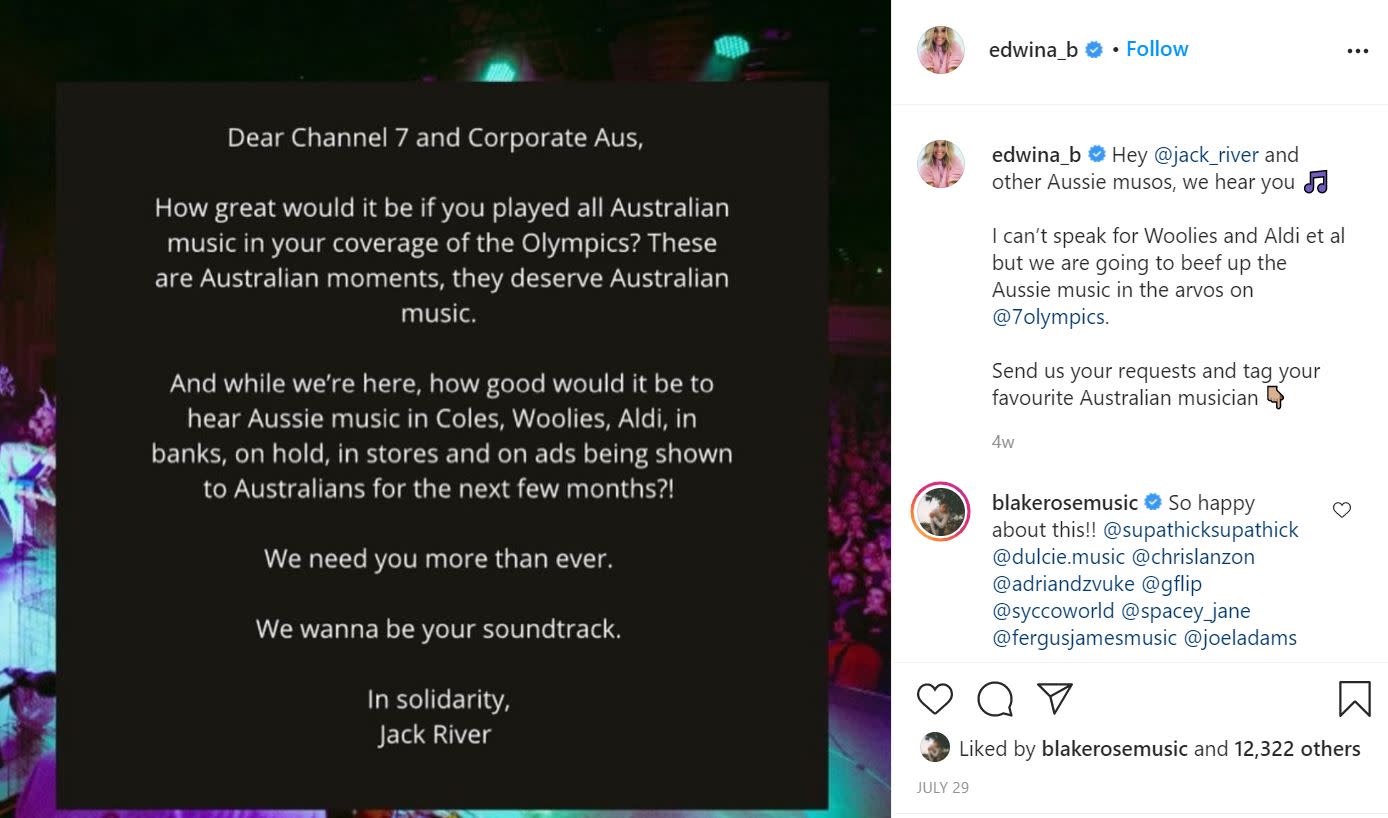
Read the Charter of Independence here.
BY EMMA ANVARI
Australia’s biggest supermarket chain is the latest target in a long stream of campaigns designed to save the music and live entertainment industries.
A petition, which was created on August 15 and was signed 100 times in its first day, is calling on supermarket giant Woolworths to ensure 50 per cent of the music played in its stores is by homegrown and local Australian talent. This is in an attempt to undo some of the heavy financial impacts of the COVID-19 pandemic on musicians.
This maintains the momentum created by Australian singer-songwriter Jack River’s call-to-arms campaign, ‘Our Soundtrack Our Story’, which asked for an Australian soundtrack for Channel 7’s coverage of the Tokyo Olympic Games.

Monash University student and Woolworths employee Luke Hall said he started the petition after being inspired by Jack River’s campaign. He said he felt frustrated that local Australian artists were generally ignored in the music landscape.
“I think the big supermarkets are where we are spending the most time at the moment, and when you hear a nice song you haven't heard before, you immediately Shazam it or try to figure out what song it was,” Mr Hall said.
“But when you're hearing British or chart songs from the 80s, you're missing such an opportunity for Aussie artists to get some exposure and get that moment where you discover them, start listening to their music and eventually buy some merch and a ticket.
“The 50 per cent quota is quite an easy change and won’t affect their business model, but it will make a substantial difference.”
This call to action comes not long after another petition, started by publicist and talent manager Karen Eck, received nearly 8,000 signatures in a move to give Australian artists a platform by encouraging corporations to change their on-hold music.
The latest survey results from the Australian Festivals Association and the Australian Music Industry Network’s data-capture initiative ‘I Lost My Gig’ suggest more than 32,000 gigs and events have been cancelled since July 1 this year, causing $94 million in lost income for the industry.
A mere one per cent of those surveyed had insurance to cover their losses, whilst 60 per cent stated they had to look for work beyond the industry to support themselves.
Mr Hall said the disparity between the government’s treatment of the arts and other areas such as sport is “quite insane, but not surprising”.
“Our Federal Government hasn't cared about the arts or anything creative for a while, and it's quite frustrating to see the hurdles that are jumped over to support athletes and sports through something like a pandemic,” he said.
“Parts of the music industry are not constructed in the best way – there’s no insurance for artists, not as much lobbying in government, or as many organised groups.
“It’s quite decentralised in the way that each artist does its own thing.”

Singer-songwriter and co-leader of Melbourne band Parkville Dylan Knur said a key challenge faced by government officials was finding a way to provide enough support so people remain in the industry to provide the same value as they were prior to the pandemic.
“I would imagine the goal would be to do as little damage to the government debt as possible whilst simultaneously making sure that post-pandemic, all of the industries that we need and want are around and present,” Mr Knur said.
“Motivation is a hard thing to find and I wonder how many musicians, even if it is technically feasible for them to remain in the industry, will be demotivated by both the realities of post-pandemic performing and also just by the complete lack of goodwill from official agencies about the whole thing that might make us all feel devalued.
“One of the things I have observed the most amongst my musician friends throughout the pandemic is an almost universal apathy to music as a thing, and I’ve felt that too, at some point.”
Mr Knur said the revenue that could be generated by playing more Australian music in public spaces such as supermarkets would be fantastic and create a real income stream for artists.
“There's money that's being paid that's just being sent all over the world, so let's just keep that money inside the Australian economy,” he said.
“The more Australian music you’re exposed to in your everyday life, the more you come to appreciate local culture and make money for Australian artists who really, really need it right now.”
Backed by the Australian Recording Industry Association (ARIA), Jack River's inaugural ‘Our Soundtrack Our Stories’ campaign encouraged the corporate world to play more Australian music to support the faltering local industry.
In the Instagram post which started it all, Jack River said that quintessentially Australian moments ought to be captured by an Australian musical backdrop.
“We need you more than ever. We wanna be your soundtrack,” Mr River said in the post.
“How good would it be to hear Aussie music in Coles, Woolies, Aldi, in banks, on hold, in stores and on ads being shown to Australians for the next few months.”

Similarly, in a statement to Music Feeds at the end of July, a spokesperson from Coles said they had confirmed with their music programmer that they would be increasing the quantity of Australian artists playing in their stores.
Coles Radio is the most listened to DAB+ station in Australia with 231,000 listeners nationwide, according to Radio Today surveys, rendering the change a significant step forwards.
Woolworths has not responded to a request for comment.